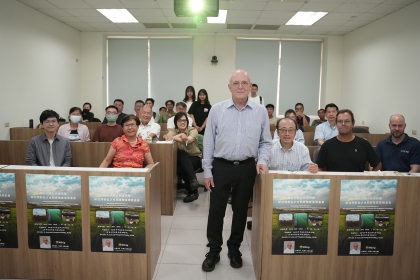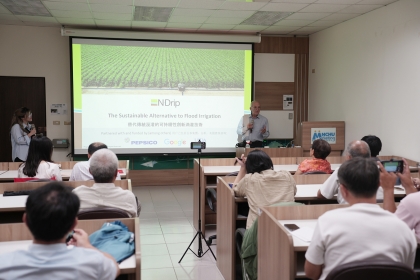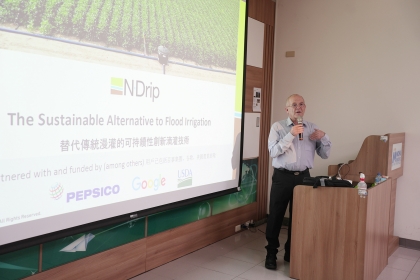NCHU Hosts Presentation on Israel’s Gravity Drip Irrigation Technology
2025-10-09
興新聞張貼者
Unit秘書室
1,168
Professor Tzong-Ru Lee of the Department of Marketing at National Chung Hsing University (NCHU) collaborated with Israel’s N-Drip Company to hold the “Presentation on the Results of Gravity Drip Irrigation Experiment for Rice Cultivation in Changhua, Taiwan” on the afternoon of October 8 at the NCHU College of Management.
The event was personally led by Professor at The Hebrew University of Jerusalem and N-Drip President Uri Shani, who presented the results of a field trial conducted in collaboration with Google in Changhua. Representatives from agricultural agencies, local farmers, Google, and TSMC also attended the event to observe and exchange insights.
Google Supports Sustainability Effort: 57% Water Savings and Remarkable Carbon Reduction
Two-thirds of Israel’s territory is desert, yet the nation’s acute water scarcity has driven innovations that transformed global agriculture. By laying narrow water tubes across barren land to deliver precise irrigation directly to plant roots, Israel turned drought into abundance and became a world leader in drip irrigation technology.
To address the water consumption challenge at Google’s Changhua Data Center, Google partnered with N-Drip to launch a paddy field drip irrigation trial in Changhua. The project began in the spring of 2025, covering about 24 hectares. Results from the first growing season showed that, compared with traditional flood irrigation, the N-Drip system achieved 57% water savings, increased rice yield by 5.4%, and reduced methane emissions by more than 80%.
Powered solely by gravity, N-Drip’s system requires no high-pressure pumps or costly filters. Integrated with AI and real-time sensor analysis, it helps farmers determine the optimal timing for irrigation and fertilization—achieving multiple benefits in water conservation, energy efficiency, carbon reduction, and yield improvement.
NCHU as a Bridge for Innovation and Sustainable Agriculture
NCHU has long served as a vital bridge linking government and industry, promoting the introduction and local adaptation of advanced agricultural technologies to drive smart and sustainable farming.
According to Professor Tzong-Ru Lee, “Facing the dual challenges of climate change and water scarcity, NCHU is committed to being a hub for collaboration among the public, private, and academic sectors. By introducing cutting-edge water-saving technologies like N-Drip’s gravity-driven system, we aim to foster sustainable transformation in Taiwan’s agriculture.”
He added that this technology provides farmers with a low-cost, low-maintenance irrigation solution that can also be applied to dryland and orchard crops in the future. Further research will continue to evaluate its impact on rice quality and long-term productivity.
The event was personally led by Professor at The Hebrew University of Jerusalem and N-Drip President Uri Shani, who presented the results of a field trial conducted in collaboration with Google in Changhua. Representatives from agricultural agencies, local farmers, Google, and TSMC also attended the event to observe and exchange insights.
Google Supports Sustainability Effort: 57% Water Savings and Remarkable Carbon Reduction
Two-thirds of Israel’s territory is desert, yet the nation’s acute water scarcity has driven innovations that transformed global agriculture. By laying narrow water tubes across barren land to deliver precise irrigation directly to plant roots, Israel turned drought into abundance and became a world leader in drip irrigation technology.
To address the water consumption challenge at Google’s Changhua Data Center, Google partnered with N-Drip to launch a paddy field drip irrigation trial in Changhua. The project began in the spring of 2025, covering about 24 hectares. Results from the first growing season showed that, compared with traditional flood irrigation, the N-Drip system achieved 57% water savings, increased rice yield by 5.4%, and reduced methane emissions by more than 80%.
Powered solely by gravity, N-Drip’s system requires no high-pressure pumps or costly filters. Integrated with AI and real-time sensor analysis, it helps farmers determine the optimal timing for irrigation and fertilization—achieving multiple benefits in water conservation, energy efficiency, carbon reduction, and yield improvement.
NCHU as a Bridge for Innovation and Sustainable Agriculture
NCHU has long served as a vital bridge linking government and industry, promoting the introduction and local adaptation of advanced agricultural technologies to drive smart and sustainable farming.
According to Professor Tzong-Ru Lee, “Facing the dual challenges of climate change and water scarcity, NCHU is committed to being a hub for collaboration among the public, private, and academic sectors. By introducing cutting-edge water-saving technologies like N-Drip’s gravity-driven system, we aim to foster sustainable transformation in Taiwan’s agriculture.”
He added that this technology provides farmers with a low-cost, low-maintenance irrigation solution that can also be applied to dryland and orchard crops in the future. Further research will continue to evaluate its impact on rice quality and long-term productivity.




